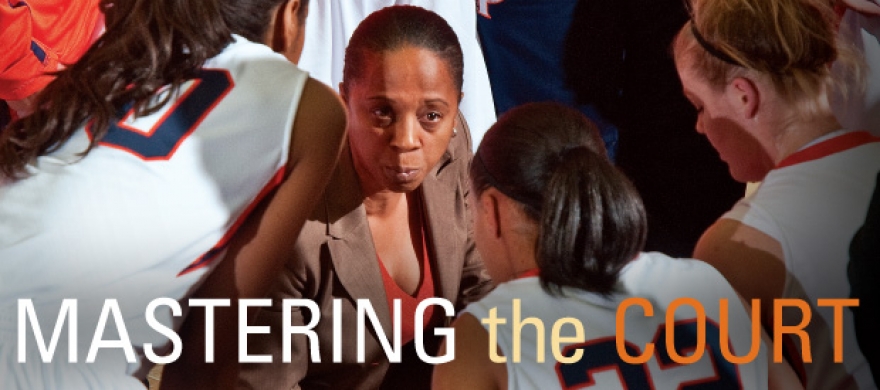Mastering the Court
Women’s basketball coach Julie Rousseau sharpens her courtside skills in the classroom.
What kind of woman will you be in four years?
It’s a question that Waves women’s basketball coach Julie Rousseau asks her team at the start of each season to get them thinking about the victories they will achieve as Pepperdine athletes and how they will navigate rough times of defeat. But beyond the missed baskets, technical fouls, and suspensions that they endure on the court, Rousseau recently became concerned about the stresses of daily life that inevitably affect her players: the rigors of their academics, time management, problem solving, performance anxiety on and off the court, and turning negative self-critiques into healthy thoughts.
“I wanted to have a better understanding of the young women who I influence every day to help them face challenges and be able to deal with them successfully,” explains Rousseau. “I thought, ‘How can I better myself and better my coaching ability, but also be a resource to help our kids?’”
She found a solution at the Pepperdine Graduate School of Education and Psychology, where she will complete the course requirements for a master’s degree in psychology this summer.
“Every year I have the opportunity to work with at least 15 young women and hopefully make a difference. We have a huge responsibility and opportunity to change people’s lives, and my tools were rusty,” admits Rousseau, who stands by her grandfather’s philosophy of using sports to teach life skills. “I needed different ways in which to help young kids develop these tools and for me to become a better coach.”
These days Rousseau cleverly implements the lessons she has learned throughout her two years at GSeP in her coaching, using sports psychology techniques like goal-setting, imagery, and self-talk, a practice that helps athletes improve their focus on a particular goal and facilitate positive-thinking in order to achieve it. “I think a lot of it is being mentally confident in our abilities to perform as the physical aspect of our training is taking place,” she explains. “Going through these strategies is all part of building mental toughness.”
Skye Barnett (’12), a recent Seaver alumna who played as the Waves’ guard for four years, recalls Rousseau’s methods of visualization and positive reinforcement after a particularly challenging injury. “I was frustrated because I felt like I wouldn’t be able to contribute to the team,” she reflects, on a time when she just felt like checking out. “There was a moment when Julie stepped in and told me that I need to stay engaged, that I can’t step away from my team, and that I have to maintain communication and cheer them on. Julie always helps you realize what you want to do and, once you figure that out, she helps you get to where you need to be.”
Rousseau also recalls and draws from her own experiences as a player coming up in the game. She insists, however, that league and college sports have come a long way since she was on the court with her former summer league teammates, including WNBA MVP Lisa Leslie and Hall of Famers Cheryl Miller and Cynthia Cooper, who were pioneers of women’s basketball in the days when women’s leagues did not exist.
“Back then, we were playing basketball to make a statement,” she explains, of the struggle to be taken seriously as female athletes. “Nowadays, the kids are doing it because it’s available and there are also a lot of rewards and recognition that come along with playing,” explains Rousseau, while noting that earning a scholarship is still essential for many players.
The way players interact with one another has evolved as well. “With so much emphasis on the social network, everyone becomes isolated and the team concept gets more and more difficult to create,” she laments.
Now Rousseau helps her team as they challenge the selfless ideals of teamwork and contends that playing on a team is a privilege, not a right. “Getting my master’s in psychology has really opened up to me the communication aspect, trying to help the players understand themselves and gain tools to not only help them in this portion of their lives, but all throughout their lives,” she says.
“Basketball will come and go, but some of these same challenges will come again. If you’re better prepared when you go through it now, you’re going to be prepared later in life. My goal is to encourage them to seek the help that they need so they have the tools to help them face this life.”
